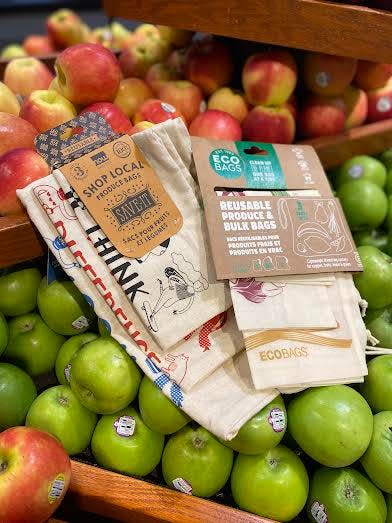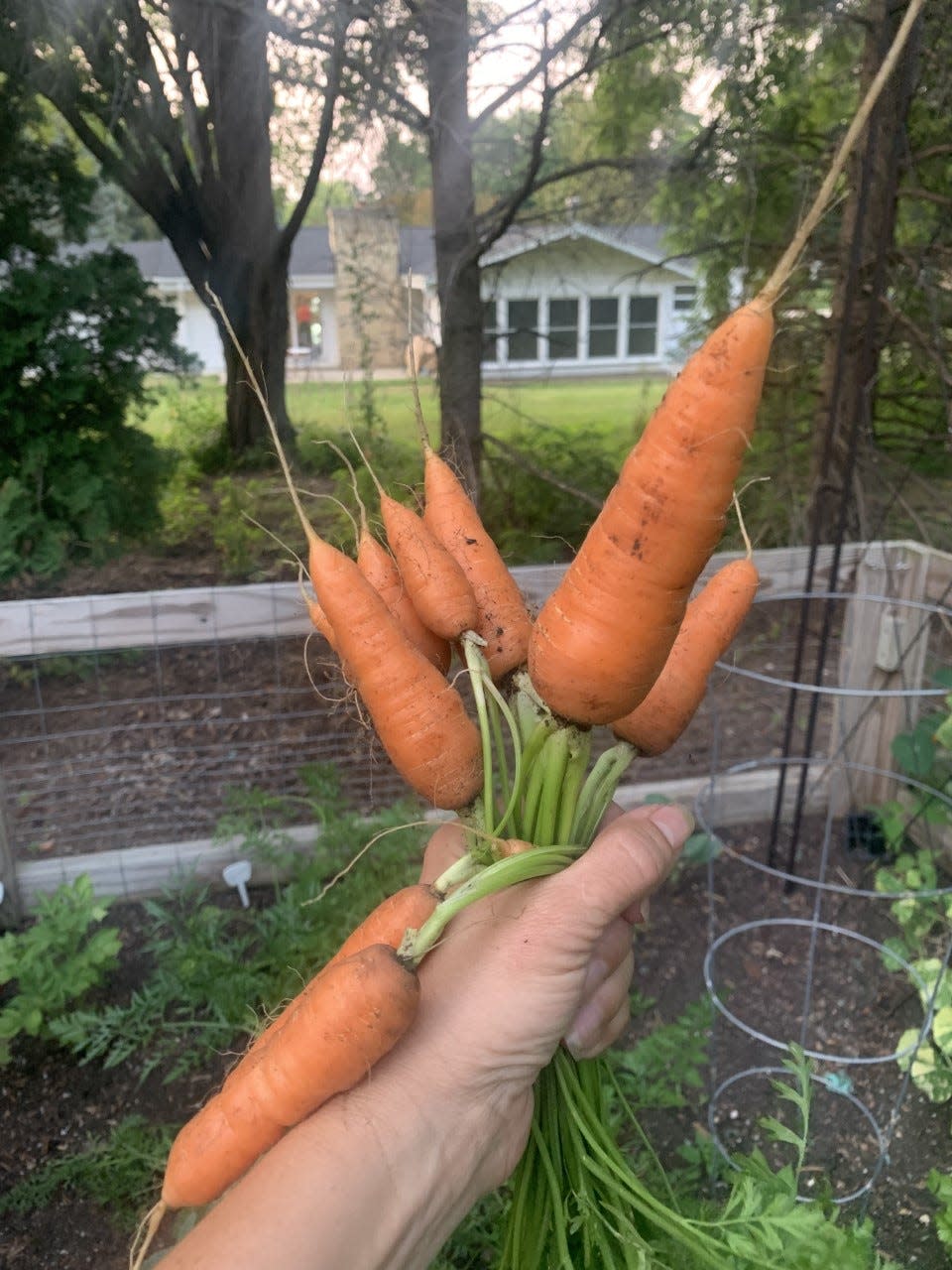Everything we eat comes in layers of plastic. How do you cut that waste?
Picture this scenario: You head to the grocery store to pick up a few things for dinner — let’s say you’re going to make tacos.
You head to produce first to pick up cilantro that’s in a plastic clamshell container. Next, you grab grape tomatoes that are in a plastic container with a plastic film window on top. Since you love raw onions on your tacos, you grab an onion and place it in a plastic bag that you pull from one of those giant rolls in the produce department.
From there, you pick up ground beef that’s placed on a plastic-foam tray before being covered in plastic wrap. Then you grab flour tortilla shells that are in a plastic bag and sour cream that’s in a plastic container. You might pick up salsa in a glass jar or treat yourself to fresh pico de gallo from the deli that’s also in a plastic container.
Before you leave, you grab dish soap in a plastic jug because this dinner is going to create its share of dirty dishes.
Finally, it’s checkout time. “Paper or plastic,” they ask.
The takeaway from this? We are drowning in plastic.
RELATED: Get free beer for volunteering at river cleanup, plus more Earth Day events in the Milwaukee area

The plastic problem
About 22 million pounds of plastic pollution enter the Great Lakes every year, according to New York’s Rochester Institute of Technology. And beer brewed with water from the Great Lakes also contains 4.05 man-made particles per liter (99% of which are plastic fibers), according to National Public Radio.
“Plastic pollution is such a big problem. It’s one of the drivers for climate change,” said Leah Holloway, a program manager at the environmental group Milwaukee Riverkeeper. Holloway is one of the lead organizers for Plastic-Free MKE, a movement of 40-plus organizations, businesses and nonprofits working since 2018 to eliminate single-use plastics in our city.
.
“We build a shared understanding and awareness of individual changes we can all make,” Holloway said. “Recycling is part of the answer, but it’s not the whole answer.”
Shop differently
Part of the reason plastic-free shopping is so difficult is that most stores aren’t set up for alternatives to plastic. Jenna Meier is on a mission to change that through her store, The Glass Pantry in Walker’s Point.
After working in the investment industry for seven years and then having her first son, she decided to take a few years off to stay home with him.
"Staying home and having this big shift in my identity, I dove headfirst into things I really loved, like cooking from scratch and shopping at farmers markets, which led me to reducing waste and trying to shop in bulk and shop locally,” Meier said.
“I realized how hard it was and how not sustainable it was. And if it wasn’t sustainable for me as a stay-at-home parent, it isn’t going to be sustainable for anyone else, like working parents.”
Her journey of reducing waste meant she was shopping at three or four stores within a week, and she tried to shop organic, too, whenever possible.
“I was weighing the options of what comes in bulk, what has packaging and what was organic,” she said. “I thought it would be so cool if there was one store that had all the things I wanted.”
And thus The Glass Pantry was born in March 2020.

Here’s how it works: You can bring in any container, from glass jars and Tupperware to Ziploc bags. The staff will weigh your container and then you can fill it with whatever you want — such as dried pasta, olive oil, Anodyne coffee beans and even dish soap and shampoo. Then the staff will reweigh the container so you’re only paying for the contents inside.
If customers don’t have their own containers, The Glass Pantry provides paper bags for free. Customers can shop at the store, 1039 S. Fifth St., or online at glasspantrymilwaukee.com, Online orders can be picked up at the store or delivered for free with a $20 order anywhere in Milwaukee County.
Another store that encourages customers to bring their own containers is Outpost Natural Foods, which aims to eliminate single-use petroleum-based plastic in its co-op packaging and consumables.
“We are rededicating our pledge, and we’re looking at 2025 as our new set of goal posts,” said Margaret Mittelstadt, director of community relations.
Outpost had eliminated single-use plastic shopping bags, but part of this rededicated pledge means finding alternative packaging for its prepared foods.
For example, a salad would be packaged in a paper-based container with a lid that folds into itself, instead of in a plastic clam-shell container. And rather than wrapping a sandwich in plastic wrap, Outpost would use wax-lined paper with a cellophane window.
Outpost originally pledged in 2019 to eliminate these plastics by 2022, but a pandemic combined with supply chain issues created obstacles.
“We are working to find solutions that meet our needs and our customers’ needs, and are still safe and effective ways to transfer fresh foods from Point A to Point B,” she said. “We don’t have the infrastructure in southeast Wisconsin to handle large-scale commercial composting. Our food scraps we can compost but not the packaging.
"We are looking at reducing the amount of plastic; true cellophane is compostable. If the plastic window is compostable, that’s a win-win. Those are the solutions we are continuing to look for.”

Real-life plastic-free shopping
One thing Holloway said can help us all live a less plastic-filled life is shopping as locally as possible because items aren’t shipped across the country with lots of packaging.
“I also make my own to-go kit. I have an old scrap of fabric that I use for a cloth napkin. I wrap up a spoon and fork from my house and a metal straw, and I always have this with me when I travel,” she said. “Whatever you’ve got you can repurpose into your own container kit. It doesn’t have to be expensive or flashy or bamboo. I’ve even reused plastic straws.”
Brookfield resident Liesel Werch had a suburban '80s and '90s upbringing in which recycling was encouraged and her mom made food from scratch.
“As I got older, I wanted to know where my food came from, and little by little, I wanted to grow more of my own food. The last few years I got annoyed with everything being in plastic. The more I make at home, the less I have to buy pre-packed from a store,” she said about starting a garden at home.

She also likes buying in bulk and bringing her own reusable produce and grocery bags to the store.
“I partition things at home. I’m the person who will wash Ziploc bags. They’re like gold in this house. I also have a lot of Mason jars and Tupperware, and I’ll use them over and over.”
Her biggest takeaway? Progress, not perfection.
“It’s very hard to eliminate all packaging overnight, unless you have a homestead and raise everything and can package everything like you want,” she said. “But I’m not set up for that in Brookfield.”
Milwaukeean Kayla Bouma lives what she likes to call a “conscious consumerism” lifestyle, and she shares her journey on her Instagram account, @sustainable.kay.
“I always say it starts with using what you have and buying less,” she said. “Switch to the mindset that you don’t have to buy something in a plastic bottle and throw it away later. You can keep it and reuse your plastic bottle.”
She also crusades for not taking a plastic bag when it’s given to you.
“If you buy one or two things, you don’t need a bag. You can just carry it out with you.”
Lauren Henesy, a Milwaukee-based influencer and blogger at henesyhouse.com, has tried to reduce her carbon footprint and waste, even with two small kids at home. Instead of using Ziploc bags, she’ll use compostable storage bags and cling wrap from Responsible Products.
She’s traded in dishwasher pods that are in a plastic container for automatic dishwasher tablets that come in a cardboard box from Ecover Zero.
As a nutrition student and yoga teacher who posts on sustainability and healthy living at her Instagram account, @queseraserawellness, Samantha Sablich from Wauwatosa decreases her plastic consumption by shopping locally and cooking at home.
“Everything we do now is so critical for everyone who comes after us,” she said. “It sounds cliché, but how can we leave the Earth a better place when we’re gone?”
She’s stopped using anything disposable, and in addition to switching to reusable bags, she’s found the cotton-and-beeswax Bee’s Wrap and glass Pyrex containers to be game-changers.
“Especially working from home, we don’t transport food as much. We can cook fresher at home.”
RELATED: Wrapping in beeswax paper cuts down on plastic waste, keeps food fresh
But the biggest change she’s made this year is being more mindful of where she shops.
“One of my New Year’s resolutions was to buy secondhand, and if I am buying new, getting it from a sustainable brand. It makes you more aware of what you’re buying and how much more appreciative of it you are.”
Although this plastic problem might not be solved by making one swap, it’s the collective efforts of everyone that will start to move the needle, advocates say.
“Tackling plastic is a huge, huge endeavor,” Mittelstadt said. “It’s complex, but it’s worth walking into and figuring it out. We have to.”
Alysha Witwicki is a retail copywriter and food writer living in Whitefish Bay. Contact her at alyshawitwicki@hotmail.com.
*****

Tips on reducing plastic consumption
1. Shop at stores that commit to zero or low waste. For a list of stores around Wisconsin, visit litterless.com/bulk-food-guide/wisconsin.
2. Bring your own containers to fill up on bulk items at stores that support that, such as Outpost Natural Foods and The Glass Pantry.
3. Bring your own reusable produce and grocery bags.
4. Assemble a plastic-free “kit” to keep in your car. Things to include: reusable shopping bags, mesh produce bags, silverware, a metal straw, a cloth napkin and a reusable water bottle.
5. Shop with intent. Make sure you really want or need something before you purchase it.
6. Shop secondhand because when you can avoid buying something new, it’s better for the environment.
7. Reuse your plastic bags as bathroom garbage bags or pet waste bags.
8. Educate yourself on which plastics are recyclable in our area (Did you know plastic straws and utensils are not recyclable in Milwaukee?). Head to city.milwaukee.gov to learn more.
Sign up for our Dish newsletter to get food and dining news delivered to your inbox.
Our subscribers make this reporting possible. Please consider supporting local journalism by subscribing to the Journal Sentinel at jsonline.com/deal.
DOWNLOAD THE APP: Get the latest news, sports and more
This article originally appeared on Milwaukee Journal Sentinel: How to cut out plastic waste that comes with your food-earth-day

